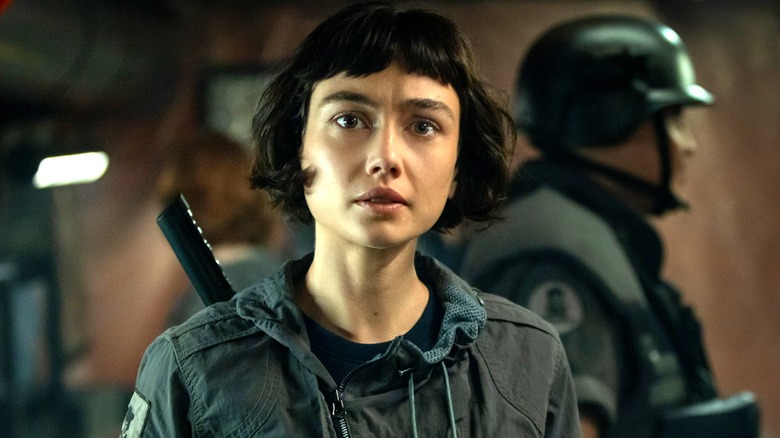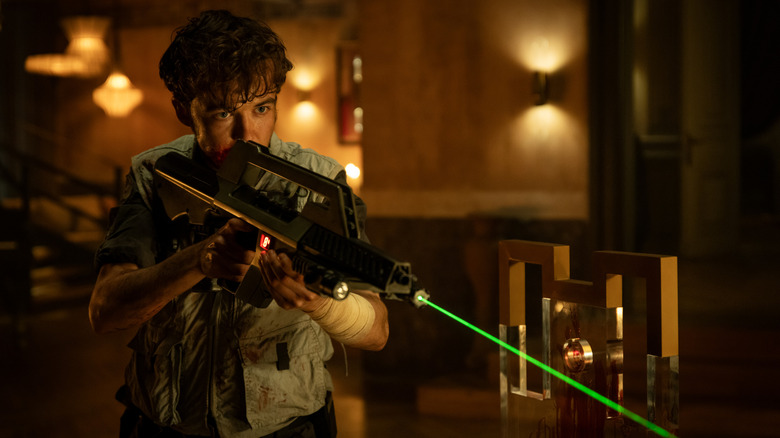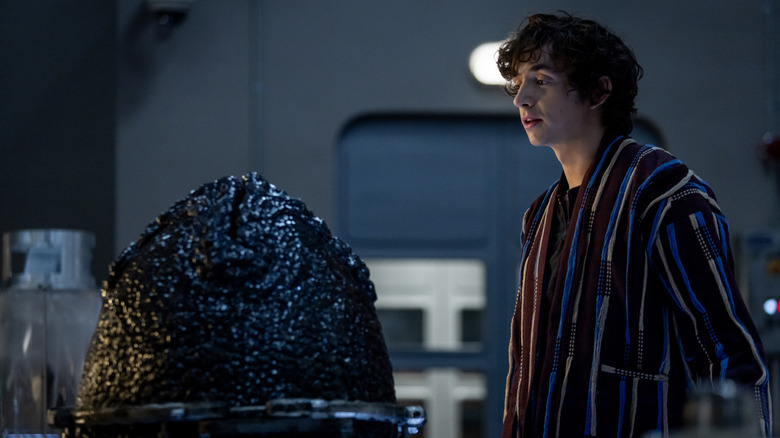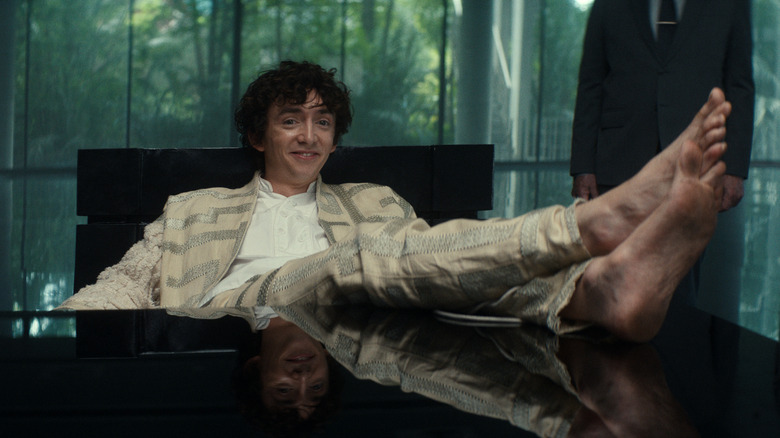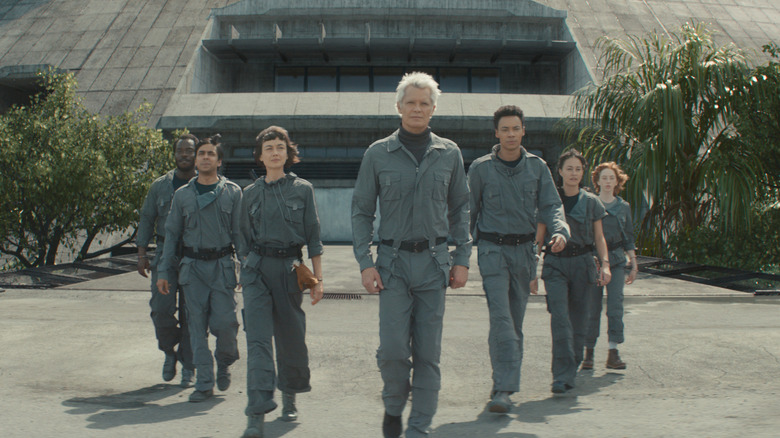Alien: Earth Ending Explained
Contains spoilers for "Alien: Earth"
After eight episodes, a whole lot of chest trauma, and many metaphors about life, death, birth, and "Peter Pan," the first season of "Alien: Earth" has reached a conclusion. The body count has gotten higher and higher over the last couple of weeks. As the dust settles and Wendy (Sydney Chandler) and her group of hybrid friends try to figure out how to rule over the humans who have been oppressing them, the audience too must figure out how they feel about the situation.
For Wendy and her fellow Lost Boys, the future remains wide-open, with most of their foes down but still alive. The mysteries behind many of the weird and terrifying extraterrestrial creatures they have encountered remain under wraps by the end of Season 1, and at least one major character is no longer in control of his own body. Here's what happened at the end of "Alien: Earth" and what that ending could mean for the larger "Alien" franchise going forward.
What you need to remember about the plot of Alien: Earth
"Alien: Earth" follows Wendy and a group of fellow former children struck with terminal illnesses. The children have been given a rare opportunity by Boy Kavalier (Samuel Blenkin), head of the Prodigy Corporation: He offers them a second chance at life, albeit in new, adult bodies. Boy is using them as experimental figures as he tries to perfect the process of transferring human consciousness into synthetic beings. While the experiment is deemed successful and the six children get seemingly immortal bodies, the "Lost Boys" — who are all named after characters from J. M. Barrie's "Peter Pan" — show various levels of trauma and stress and are quite obviously still kids inside. Nonetheless, in an act of greed, Boy decides to deploy his prototypes to the crash site of the USCSS Maginot, a Weyland-Yutani deep space research vessel which has impacted Earth and left only a single survivor.
The Maginot just happens to have crashed in Boy's neck of the woods (Prodigy City in New Siam), and he is hoping to beat Weyland-Yutani to the alien creatures and experiments which were being held on the ship. What he doesn't know is that the sole survivor — Morrow (Babou Ceesay), the Maginot's chief security officer — is a cyborg who is fiercely loyal to Weyland-Yutani. Morrow behaves like many robotic enablers have throughout the history of the "Alien" movie saga and has decided to do anything possible to ensure the alien cargo is secured for his employers. He promises the top brass that he'll get Weyland-Yutani's property back and vows to kill Boy Kavalier, to boot. With Boy now conducting alien experiments and Wendy having special, secret communicative powers of her own, the battle for Earth's future is definitely on.
What happened at the end of Alien: Earth?
Boy Kavalier's plan to escape the island where his Neverland Research Facility is located is waylaid by Wendy and her brother, Hermit (Alex Lawther), through a combination of Wendy's innate knowledge of synthetic life, her ability to communicate with the Xenomorphs, and the might of her fellow Lost Boys. After catching wind of Boy's plan to erase and reset the hybrids, they capture him along with the Prodigy Corporation synthetic Kirsh (Timothy Olyphant) and all of his allies, either disabling them or physically overwhelming them and placing them in the prison where the Lost Boys were being held. Wendy declares that her intent is "to rule," which is met by a laugh from a bleeding Boy.
Elsewhere on the island, Weyland-Yutani forces arrive to search for the samples and specimens that were taken from their crashed deep space vessel. Elsewhere, the battered Prodigy Corporation technician Arthur Sylvia (David Rysdahl) — whose body was used as an incubator for a Xenomorph egg and who has been lying dead on the beach being prodded by all sorts of ocean life — gets occupied by the escaped Trypanohyncha Ocellus eyeball creature, which is the source of one of the goriest moments in the "Alien" franchise. This parasitic lifeform, which is essentially an eyeball with tentacles, can imbed into and take control of other creatures, as it did with a sheep in Episode 4. Arthur (or his body, at least) rises from the dead but does not immediately reunite with his old friends, leaving the door wide open for Season 2.
What the end of Alien: Earth means
"Alien: Earth" is laden with allusions and direct nods to "Peter Pan," the story of a boy who refuses to grow up. Of course, Wendy is named after Wendy Darling from J.M. Barrie's classic tale, and her arc mirrors that of her namesake, as she empowers the Lost Boys and encourages them to embrace maturity. When we first meet Wendy in "Alien: Earth," she's naïve, obsessed with her brother, and has no desire to grow up. By the time the Season 1 finale rolls around, she's harnessed her skills and is using them to defeat the threats surrounding her. Wendy becomes the leader of the hybrids not only because she's the "oldest" (as in the first successful hybrid), but also because of her personality and her abilities, much like Barrie's story.
Of course, if Wendy is Wendy Darling, then Boy Kavalier is Peter Pan. If you've only ever seen the Disney version, then you may not be aware of just how dark the story of Peter Pan actually is — not only does he kill pirates in Neverland, it's implied that he also kills members of the Lost Boys if they decide that they want to grow up, disobeying his one rule. In "Alien: Earth," Boy adopts the same attitude, choosing to erase his own Lost Boys rather than let them slip from his grasp. He needs them to be perfect for his investors and doesn't care about them as individuals. The ending of "Alien: Earth" tells us that sometimes we need to cut ties in order to grow and reach our full potential, something Wendy comes to realize before it's too late.
Alien: Earth is also a warning about corporate greed and the rise of tech bros
The other big message put forward by "Alien: Earth" creator Noah Hawley is that a future in which corporations hold more power than elected governments is a bleak one. The show is a parable about the dangers of tech oligarchies holding too much sway in society. By the time the story begins, Earth is controlled by a handful of huge corporations. There's Weyland-Yutani, the villainous entity behind pretty much everything that's gone wrong in the "Alien" franchise up to this point, and four others: Threshold, Lynch, and Dynamic, which don't get fleshed out in Season 1, and Boy Kavalier's newcomer Prodigy.
Boy's urge to get ahead of the pack purely for the sake of it ends up being his downfall. He was doing just fine without the alien cargo stored on the USCSS Maginot, but he simply couldn't help himself when the chance to start experimenting on it presented itself. It's progress for the sake of progress, calling to mind the AI gold rush that's taking place in the real world. According to Samuel Blenkin, Boy is meant to evoke the tech bros who are currently in the public eye. "Like all of Noah's characters, they clearly have strands of the stuff that we're facing today and what's resonant right now," the actor told Tech Radar.
The battle between Weyland-Yutani and the Prodigy Corporation represents corporate cracker gobbling on a massive scale, a situation in which people become toys and employees are expendable. The constant search for the new, the hit, the important resource has become the hallmark of the tech sphere. Boy acts in the interest of progress and profit and he puts humanity at risk by doing so. Is it any wonder that Wendy, her friends, and her brother felt like they had a moral duty to stop him?
What the end of Alien: Earth could mean for the franchise
"Alien: Earth" broadens the notion of what an "Alien" entry can be. What's great about it is the way it smashes the world of "Alien" into our own, and that's what audiences are loving about it. This includes Ellen Ripley herself, Sigourney Weaver, who told Collider: "What I admire about it is it's not 'Alien'-centric. It is about what world we will be living in in 100 years. I think the scope of it is so much bigger than an 'Alien' project. Fascinating. Much more about our world, what's going to be happening to it, what's going to be important, the role of greed."
Of course, from the moment the title of the show was announced, fans knew that it was going to bring the Xenomorphs to our planet for the first time, but few expected "Alien: Earth" to deliver such a scathing critique on the state of the world in 2025. Though installments like "Aliens" and "Alien: Romulus" have spoken out in favor of the little guy over Wayland-Yutani's corporate might, the FX series takes this to a whole new level, giving us an idea of where the franchise is headed. Could "Alien" become less about confined horror and more about corporate wars?
Wendy's presence in the "Alien" franchise changes it forever because she can communicate directly with Xenomorphs, something only Ripley 8 from "Alien: Resurrection" could do because she was part Xenomorph. This adds a layer of depth to the merciless killing machines. Their loyalty to Wendy and ability to understand her is another fresh twist to your typical "Alien" plotline. "Alien: Earth" proves that the franchise still works without Ripley, though we'll have to wait for the second season (which is reportedly in development) before we can say for sure whether or not this new direction is the correct one.
